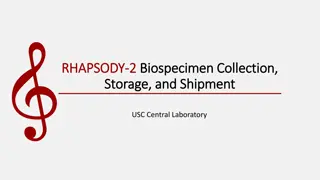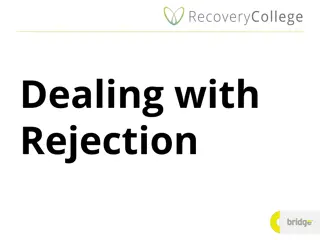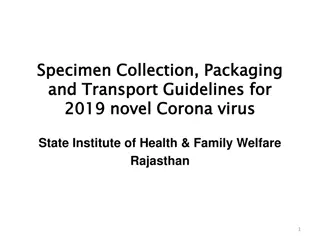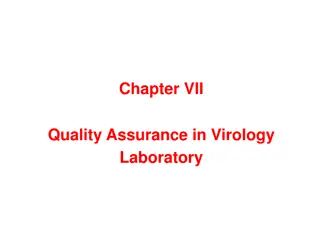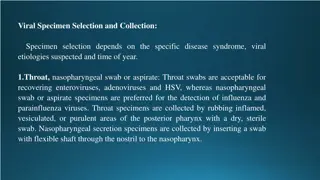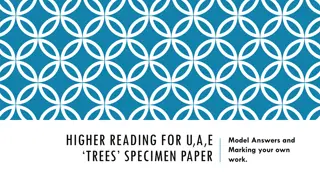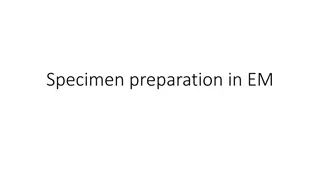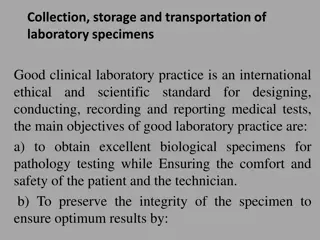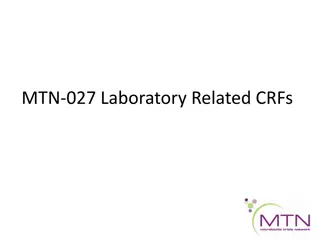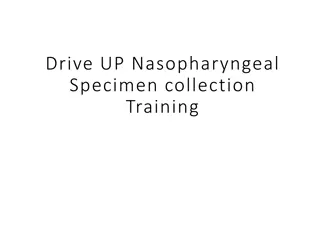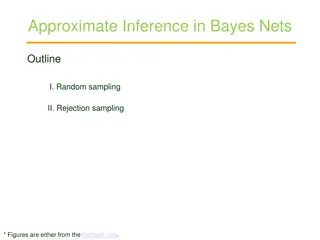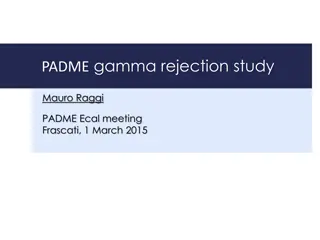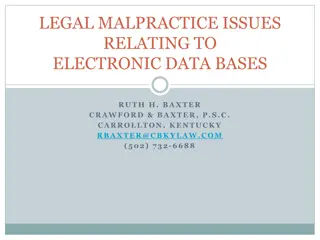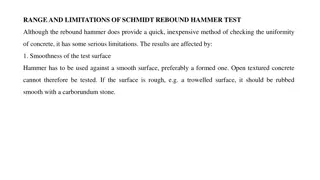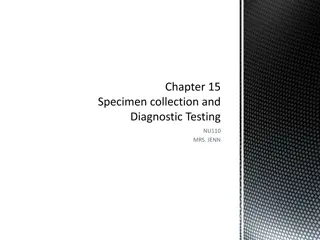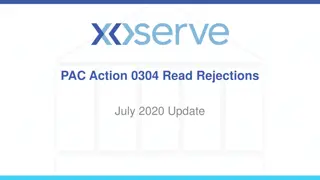Is Your Mobile App Prepared Understanding Store Rejection Factors
To avoid this pitfall, it\u2019s crucial to understand the potential rejection factors and ensure your app is polished and compliant before submission. As a leading best mobile app development services in Arizona, we at Net-Craft.com believe in transparency and preparation. In this article, we\u2019
1 views • 3 slides
Biospecimen Collection, Storage, and Shipment Overview at USC Central Laboratory
This overview covers the types of biospecimens collected, specimen collection schedule, supplies, protocols, and shipping instructions at the USC Central Laboratory. It includes details on whole blood collection for different assays, storage procedures, and shipment to USC Labs and Charles River Lab
0 views • 21 slides
Transplantation Immunology
Learn about histocompatibility systems, alloantigen recognition, graft types, graft rejection mechanisms, graft-versus-host disease risk factors, HLA typing methods, and detecting HLA antibodies in clinical transplantation. Explore hyperacute and acute rejection episodes, their immunological mechani
4 views • 11 slides
Long Term Care Service Billing Requirements and Coding Overview
This document outlines the billing requirements and coding specifications for long-term care services, including claim submission rules, eligibility criteria for payment consideration, and necessary information such as NPI, Taxonomy Codes, and Type of Bill Facility Codes. Changes in billing procedur
0 views • 34 slides
Challenges of Fear and Rejection in Human Relationships
The fear of rejection can control us, leading to feelings of worthlessness when we seek acceptance from others. Various scenarios, from social events to professional roles, illustrate how fear of rejection impacts individuals differently. The discussion questions prompt self-reflection on past exper
0 views • 22 slides
Coping with Rejection and Recycling Your Proposal Overview
Learn how to cope with rejection and recycle your proposal with expert advice from researchers in various fields. Understand the importance of learning from rejection, being prepared for multiple applications, and reevaluating your passion for your project. Discover tips on analyzing rejection, crea
2 views • 32 slides
Understanding and Overcoming Rejection in Life
Dealing with rejection is a challenging aspect of life that everyone faces. Rejection can be painful, but it is also a part of growth and personal development. This article discusses the importance of embracing rejection, provides insights on why rejection can be beneficial, and offers practical tip
1 views • 14 slides
Rejection of Plaint under the Code of Civil Procedure in Pakistan
The Code of Civil Procedure in Pakistan governs the administration of civil justice, with provisions for rejecting a plaintiff's claim under specific circumstances. Grounds for rejection include insufficiently disclosing the cause of action, improper valuation of relief, insufficient stamping on pap
0 views • 17 slides
Understanding Differential Leucocyte Count for Blood Disorders
Differential Leucocyte Count (DLC) is crucial for diagnosing blood-related disorders by analyzing the distribution and morphology of white blood cells. Dr. Versha Prasad explains the significance, normal values, and various conditions like neutrophilia, lymphocytosis, monocytosis, and basophilia. Th
1 views • 15 slides
Guidelines for 2019 Novel Coronavirus Specimen Collection
The guidelines outline the responsibilities of clinicians in collecting clinical specimens for testing 2019-nCoV, emphasizing the importance of following case definitions and using proper procedures for specimen collection, packaging, and transport. It also provides details on selecting patients for
0 views • 14 slides
Quality Assurance in Virology Laboratory
This chapter focuses on quality assurance in virology laboratory, covering topics such as quality control, documentation of test results, laboratory safety rules, and more. It explains the types of quality control, quality assurance cycle, and process areas of quality assurance in laboratory testing
3 views • 19 slides
ASTM D3786/D3786M-18 Standard Test Method for Bursting Strength of Textile Fabrics
This standard test method, ASTM D3786/D3786M-18, specifies the procedure for determining the bursting strength of textile fabrics using a diaphragm bursting strength tester. The test involves clamping the specimen over an expandable diaphragm and applying pressure until the fabric ruptures. The burs
0 views • 16 slides
Understanding Rejection and Its Impact on Our Lives
Rejection is the root of offense and can have profound effects on our mental health and well-being. It stems from disregarding, invalidating, or disrespecting someone or something, leading to limiting beliefs and triggers that impact our behavior and emotional state. Exploring rejection can help unc
0 views • 10 slides
Guidelines for Specimen Rejection and Acceptance
Specimens may be rejected if improperly labeled, insufficient quantity, delayed receipt, incompatible requisitions, or in improper containers. General and specific criteria are outlined for various tests including microbiology, urinalysis, blood cultures, and more. Adherence to these criteria helps
0 views • 11 slides
Viral Specimen Selection and Collection Overview
Specimen selection for viral testing depends on the suspected viral etiologies and disease syndrome. Throat and nasopharyngeal swabs are used for different viruses, while rectal swabs, urine, blood, and tissue samples are also collected for specific viral detection. Proper specimen transport and sto
0 views • 7 slides
Higher Reading for UAE Trees Specimen Paper Model Answers
This specimen paper provides model answers and guidance on marking your own work for a higher reading exam focusing on trees in the UAE. The questions cover various aspects such as identifying key points, analyzing language choices, and interpreting the writer's perspectives on environmental issues.
0 views • 32 slides
Understanding Specimen Preparation in Electron Microscopy
Living things cannot survive in an electron microscope due to the high temperature generated by the electron beam, vacuum inside the microscope, and need for specimen preparation steps like fixation, dehydration, freezing, cutting, and mounting. Fixation involves stabilizing tissue with chemicals, d
3 views • 10 slides
Understanding Donor-Specific Antibodies in Kidney Transplantation
Antibodies against antigens in the major histocompatibility complex play a crucial role in kidney transplant rejection. Different types of donor-specific antibodies can lead to rejection at various stages post-transplantation. Methods to discover donor-specific anti-HLA antibodies include complement
0 views • 16 slides
Best Practices for Clinical Laboratory Specimen Handling
Good clinical laboratory practice emphasizes the proper collection, storage, and transportation of laboratory specimens to ensure accurate and reliable test results. Key aspects include obtaining high-quality specimens, maintaining specimen integrity, and following standard precautions to prevent co
6 views • 6 slides
Human Predicament: A Moving Tale of Loss and Rejection
A poignant narrative unfolds as a young survivor of World War II attempts to reclaim her belongings from an acquaintance's house. The encounter exposes deep-seated emotions of loss, rejection, and the complexities of post-war existence. Through subtle interactions and realizations, the story delves
1 views • 11 slides
Next Steps After Proposal Rejection: Guidance from IIS Experts
Navigate the process of rejection with insights from IIS office hours. Understand review feedback, communicate effectively with team members, interpret scores, and engage positively with NSF program directors. Join the IIS listserv for future opportunities. Embrace rejection as a step towards improv
0 views • 5 slides
Common Laboratory Techniques in Zoology - Urine and Stool Specimen Analysis
In the Biology Department at Al-Mustansiriyah University, students learn laboratory techniques for collecting and analyzing urine and stool specimens. The process involves random urine sample collection, urine tests for chemical components, urine culture, stool specimen analysis for pathological con
0 views • 10 slides
Understanding Jesus' Rejection in the Gospel of Mark
Explore the reasons behind the rejection of Jesus by the Pharisees in the Gospel of Mark, including his conduct, challenges, and claims. Discover how his actions conflicted with religious norms of fasting and Sabbath observance, leading to opposition from religious leaders. Jesus' role as the Brideg
1 views • 11 slides
Understanding Social Anxiety and Avoidant Behaviors
Social anxiety involves intense fear and avoidance of social situations, leading to catastrophic thinking and physiological reactions like performance anxiety. Individuals may anticipate criticism, rejection, or embarrassment, which can interfere with their functioning. This condition can manifest a
3 views • 30 slides
Laboratory Related CRFs for Pharmacokinetics Study
This collection encompasses various CRFs related to laboratory procedures in the context of Pharmacokinetics for a study. It includes forms for enrollment, specimen storage, safety laboratory results, and specific days for sample collection. The CRFs detail the storage, collection, and documentation
0 views • 14 slides
Proper Clinical Chemistry Specimen Collection and Processing
Proper collection, identification, processing, storage, and transport of various types of biological specimens are crucial for obtaining accurate diagnostic test results. Different types of specimens, such as whole blood, serum, plasma, urine, feces, saliva, and various bodily fluids and tissues, ar
0 views • 18 slides
Wisdom and Rejection: Biblical Insights on God's Wisdom and Human Perception
Explore the contrasts in perception towards John the Baptist and Jesus Christ in Luke 7, emphasizing the acceptance of God's wisdom over human judgment. Reflect on the need for humility and reverence in seeking divine wisdom amidst societal rejection and worldly influences. Discover the significance
0 views • 8 slides
Developing a Pacific Community Marine Specimen Bank and Case Studies
This information paper showcases the establishment of a Pacific Community Marine Specimen Bank, focusing on the WCPFC Tuna Tissue Bank and case studies on bigeye and yellowfin tuna. The paper discusses the importance of specimen banks, ongoing projects, challenges, and key research questions regardi
0 views • 15 slides
Nasopharyngeal Specimen Collection Training
This training covers the procedures for collecting a nasopharyngeal (NP) specimen for COVID-19 testing. It includes learning objectives, roles of registered nurses and ancillary staff, proper PPE usage, step-by-step collection procedures, and handouts for participants. The training emphasizes proper
0 views • 12 slides
Approximate Inference in Bayes Nets: Random vs. Rejection Sampling
Approximate inference methods in Bayes nets, such as random and rejection sampling, utilize Monte Carlo algorithms for stochastic sampling to estimate complex probabilities. Random sampling involves sampling in topological order, while rejection sampling generates samples from hard-to-sample distrib
0 views • 9 slides
Insights from PADME ECal Meeting: Rejection Studies and BG Analysis
Explore the discussions and findings from the PADME ECal meeting on topics such as gamma rejection studies, toy MC studies of gamma background, ECAL geometrical definitions, BG studies, and detector acceptance. Key points include the proposal for a lead glass-based SAC and considerations on ineffici
0 views • 27 slides
Challenges and Solutions in Legal Malpractice Issues Related to Electronic Databases
The use of electronic databases in legal practices poses challenges such as document rejection reasons, recording standards, and risks like employee errors. Solutions include statutes allowing corrections and clarifications to maintain document validity. Understanding the e-filing process and typica
0 views • 12 slides
Limitations of Schmidt Rebound Hammer Test
The Schmidt rebound hammer test is a quick and inexpensive method to check concrete uniformity. However, limitations include sensitivity to test surface smoothness, specimen size and rigidity, age of specimen, moisture conditions, type of coarse aggregate, type of cement, and carbonation of the conc
0 views • 5 slides
Insights into Editorial Responsibilities and Avoiding Desk Rejection in Academic Publishing
Editors play a crucial role in setting the tone of academic discourse, enforcing ethical standards, and advancing technical standards in publishing. Avoiding desk rejection in academic publishing can significantly impact the acceptance of a paper, with an emphasis on the importance of writing qualit
0 views • 32 slides
Clinical Chemistry Specimen Collection and Processing Overview
Clinical chemistry specimen collection involves obtaining blood samples for analysis. Serum and plasma are commonly used specimens, each requiring specific handling. Different anticoagulants like heparin are used to prevent blood clotting during sample processing. Heparin, a widely used anticoagulan
0 views • 15 slides
Laboratory Testing and Specimen Submission Guidelines
Comprehensive guidelines and procedures for laboratory testing, specimen submission, ordering supplies, filling out forms, CDC submissions, and packaging/shipping. Includes information on DSHS lab accounts, specimen forms, ordering supplies, and shipping protocols. Proper submission procedures and c
0 views • 77 slides
Understanding Blood Haemolysis and Specimen Rejection in Laboratory Testing
Blood haemolysis refers to the release of haemoglobin from red blood cells, affecting test results. Specimen rejection occurs due to various factors like unsuitable conditions, safety hazards, and improper labeling. Capillary puncture technique is used for patients with difficult venous access. Guid
0 views • 8 slides
Best Practices for Specimen Collection in Microbiological Examinations
Proper specimen collection is crucial for accurate microbiological examination results. Starting investigations early, avoiding contamination, and using leak-proof sterile containers are key. Important questions and considerations before collecting a specimen, along with criteria for rejecting sampl
0 views • 28 slides
Guidelines for Safe and Efficient Diagnostic Testing Procedures
This content provides detailed guidelines and procedures for specimen collection and diagnostic testing in healthcare settings, covering aspects such as patient assessment, specimen labeling, completing diagnostic requisition forms, and specific procedures like amniocentesis, arteriography, barium e
0 views • 21 slides
Industry Performance Rejection Analysis Summary
This update provides a detailed analysis of read rejections related to PAC actions from July 2020. It includes information on rejections analyzed, comparisons made against different tolerance levels, AQ Corrections Reporting, unique MPRs, and top rejection trends by shippers. The summary also highli
0 views • 5 slides

